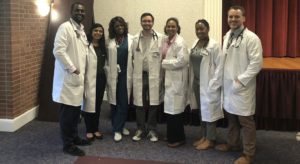January 31st, 2020
Sorry, We’re Transitioning
Allison Latimore, MD

Dr. Latimore is the Education Chief Resident at the MedStar Washington Hospital Family Residency Program in Washington, DC
“We are transitioning.” In July of my intern year, this was the sentence that the CEO of our community hospital used to tell the staff that the hospital was closing its inpatient services. The emotions that traversed my mind were quite vast, to say the least. Anger was undeniably at the top of the list, but mostly directed at myself.
Initially, I thought medical school definitely did not prepare me for this. But it actually might have. While I was in medical school, our affiliated hospital was always in debt, and there was always talk about potential closure of inpatient services and labor and delivery, but nothing ever happened. Following the closure news in my residency program, I constantly questioned myself. How could I have not seen this coming? How could I have been so naïve? I saw what was happening at my own alma mater. What I did not see was that hospitals are closing all over the country.
Why are hospitals closing?
The answer seems very simple. Money. In the past decade, rural hospitals have been closing at an alarming rate, but this issue does not just affect rural areas. Hahnemann Hospital, in Philadelphia, had debt and losses of about $3 million to $5 million per month. Many hospitals that closed in 2019 cited decreased patient volume and decreased reimbursement as reasons behind their closures. The company that owned my community hospital planned on making investments in services such as telehealth, care coordination, home care, and community-based behavioral healthcare. But where does that leave the residents and the patients?
What can residents do to prepare?
My biggest piece of advice to every residency applicant is to research your employer. Many medical students are novices when it comes to joining the workforce. Being a resident was my first “real” job. I never thought to google the hospital that I was going to be employed by. If I had, I would have seen articles about potential closure, before the news was delivered by the CEO. I am not sure whether knowing this information would have changed my decision, but making an informed decision is much better than being blindsided.
I’m sure the displaced residents from Hahnemann Hospital would agree. I was very fortunate to be in a program that landed on its feet, and our residents were not “orphaned.” As a medical student, I had never heard the term “orphan” residents and couldn’t fathom starting a residency program and not finishing at that program.
I cannot imagine the immense stress of being an intern, having to continue to work at a place with impending doom, being on the hunt for an open spot, and setting up interviews all at the same time. Unfortunately, this is a possibility every medical student and resident should know about. We should be trained to review contracts prior to the match process. We should have a clear understanding that our programs could close, and we should know what the next steps are. Being a doctor seems like a very secure job, but your training could be compromised by hospital closures — perhaps we should not feel so secure.
How will this affect medical education in the future?
Safety net hospitals are the cornerstone of medical education. Many residents and medical students learn primarily in these hospitals. It teaches us compassion for the underserved and how to make a difference with limited resources. If there are no community hospitals left, who is going to train physicians to work with underserved populations, and where will these patients go? Surrounding hospitals try to pick up the pieces and accommodate the patients and the learners. But does that lead to oversaturated learning environments and less quality of care for the patient? How can our healthcare system create a safe space for patients and learners? Exposure to community medicine is one way to create physicians who are culturally sensitive and willing to return to underserved care. Without community hospitals, I am not so sure what the future of medicine will look like.




This was very informative, any transitional period is definitely stressful. Definitely never realized how competitive and unlikely it is to find openings.